Ganesh vs. Ganesha — What's the Difference?
Edited by Tayyaba Rehman — By Fiza Rafique — Updated on April 16, 2024
Ganesh, often spelled Ganesha, refers to the same Hindu deity; "Ganesh" is a common shorthand, while "Ganesha" is the more formal name.

Difference Between Ganesh and Ganesha
Table of Contents
ADVERTISEMENT
Key Differences
Ganesh is a widely recognized name used in everyday conversation and informal contexts, highlighting the deity's approachability. Whereas Ganesha is the formal and complete name, used in religious texts and formal rituals.
In terms of pronunciation, Ganesh drops the final 'a,' making it slightly quicker and easier to pronounce in casual dialogue. On the other hand, Ganesha retains the original Sanskrit pronunciation, emphasizing the traditional and respectful articulation of the name.
When it comes to cultural significance, both names refer to the elephant-headed god known for removing obstacles. However, Ganesha often carries a more ceremonial connotation, associated with specific prayers and religious ceremonies.
In literature and art, Ganesh might be used more colloquially, reflecting a more modern or accessible depiction. In contrast, Ganesha is typically employed in classical representations and scholarly works, maintaining a link to ancient traditions and scriptures.
Within the global context, Ganesh is a more commonly used form in quick references or popular culture, like in movies or books. Ganesha, on the other hand, is preferred in contexts requiring formality or adherence to traditional Hindu practices.
ADVERTISEMENT
Comparison Chart
Spelling & Pronunciation
Shorter, ends in "sh"
Longer, ends in "sha"
Usage
Informal, everyday conversation
Formal, religious contexts
Cultural Connotation
Approachable, modern
Ceremonial, traditional
Depiction in Media
Popular culture, modern media
Classical art, scholarly works
Pronunciation Context
Easier, quicker in speech
Respectful, traditional articulation
Compare with Definitions
Ganesh
A Hindu deity known for removing obstacles.
Many people keep a statue of Ganesh in their homes for good luck.
Ganesha
Worshipped for wisdom and as a remover of obstacles.
Ganesha idols are immersed in water during the Visarjan ritual.
Ganesh
Symbolic of wisdom and intelligence.
Students pray to Ganesh before exams.
Ganesha
The formal name for the elephant-headed Hindu god.
Devotees chant hymns dedicated to Ganesha during puja.
Ganesh
Associated with beginnings and is revered before starting new ventures.
A ceremony involving Ganesh is performed before the groundbreaking of a new building.
Ganesha
Invoked at the start of prayers, important undertakings, and religious ceremonies.
Ganesha prayers are essential at the commencement of rituals.
Ganesh
Often depicted with an elephant head.
The story of how Ganesh got his elephant head is popular in Hindu lore.
Ganesha
Iconic in Hindu religious art and scripture.
Ancient texts describe Ganesha's role in scriptural tales.
Ganesh
The son of Shiva and Parvati in Hindu mythology.
Ganesh is worshipped during the Ganesh Chaturthi festival.
Ganesha
Celebrated in the festival of Ganesh Chaturthi.
The ten-day Ganesha festival culminates in a grand procession.
Ganesh
The god of wisdom and the remover of obstacles, son of Shiva and Parvati, depicted as a short fat man with an elephant's head.
Ganesha
Ganesha (Sanskrit: गणेश, IAST: Gaṇeśa), also known as Ganapati and Vinayaka, is one of the best-known and most worshipped deities in the Hindu pantheon. His image is found throughout India, Nepal, Sri Lanka, Thailand, Indonesia (Java and Bali), Singapore, Malaysia, Philippines, and Bangladesh and in countries with large ethnic Indian populations including Fiji, Guyana, Mauritius, and Trinidad and Tobago.
Ganesh
Hindu god of wisdom or prophecy; remover of obstacles
Ganesha
The god of wisdom and the remover of obstacles, son of Shiva and Parvati, depicted as a short fat man with an elephant's head.
Ganesha
Hindu god of wisdom or prophecy; remover of obstacles
Common Curiosities
Why are there two names for the same deity?
The variation in names reflects different linguistic and cultural practices within Hinduism.
What is the difference between Ganesh and Ganesha?
Ganesh is a shorthand version commonly used in casual speech, whereas Ganesha is the full, formal name used in religious contexts.
How are Ganesh and Ganesha depicted in religious art?
Both are depicted with an elephant head, though Ganesha might appear in more traditional and elaborate artistic styles.
Is there any difference in the symbolic meaning between Ganesh and Ganesha?
No, both names refer to the deity known for wisdom and removing obstacles.
Is there a particular way to pray to Ganesh compared to Ganesha?
No specific way differentiates praying to Ganesh from Ganesha; however, the formalities might differ with Ganesha often invoked with more traditional and elaborate rituals.
What is the significance of the elephant head of Ganesh/Ganesha?
The elephant head symbolizes wisdom, understanding, and a discriminating intellect that one must possess to attain perfection in life.
Are there any specific days considered auspicious for worshipping Ganesh or Ganesha?
Yes, Tuesdays and Chaturthi (the fourth day after a new moon or a full moon) are considered particularly auspicious for worshipping Ganesh or Ganesha.
Do Ganesh and Ganesha represent different aspects of the same deity in any regional practices?
No, the names refer to the same deity, though regional practices might highlight different aspects of his character, such as his wisdom or his role as a protector.
Can Ganesh and Ganesha be used interchangeably?
Yes, they can be, but Ganesha is preferred in more formal or religious settings.
How do the roles of Ganesh and Ganesha differ in Hindu mythology?
There is no difference in their mythological roles; both names describe the god who is the remover of obstacles and the patron of arts and sciences.
In which scriptures are Ganesh and Ganesha mentioned?
Both are mentioned in major Hindu scriptures like the Mahabharata, Puranas, and especially the Ganapati Atharvashirsha.
What festivals are associated with Ganesh and Ganesha?
Both names are celebrated during the Ganesh Chaturthi festival, which venerates the deity’s birth and blessings.
Where is the worship of Ganesh/Ganesha most prevalent?
Worship of Ganesh or Ganesha is most prevalent in India, particularly in the states of Maharashtra, Karnataka, Tamil Nadu, and Andhra Pradesh, but he is also revered in other parts of South Asia and by the Hindu diaspora worldwide.
What are the common offerings made to Ganesh and Ganesha during worship?
Offerings typically include sweets (like modak and laddu), flowers, and fruits; specific rituals might vary slightly depending on whether the context is more formal (Ganesha) or casual (Ganesh).
What is the origin of Ganesh/Ganesha’s names?
Both names are derived from Sanskrit: "Gana" meaning group or multitude and "isha" or "esha" meaning lord or master, reflecting his role as the leader of Shiva’s attendants.
Share Your Discovery

Previous Comparison
Ridge vs. Esker
Next Comparison
Malayan vs. MalaysianAuthor Spotlight
Written by
Fiza RafiqueFiza Rafique is a skilled content writer at AskDifference.com, where she meticulously refines and enhances written pieces. Drawing from her vast editorial expertise, Fiza ensures clarity, accuracy, and precision in every article. Passionate about language, she continually seeks to elevate the quality of content for readers worldwide.
Edited by
Tayyaba RehmanTayyaba Rehman is a distinguished writer, currently serving as a primary contributor to askdifference.com. As a researcher in semantics and etymology, Tayyaba's passion for the complexity of languages and their distinctions has found a perfect home on the platform. Tayyaba delves into the intricacies of language, distinguishing between commonly confused words and phrases, thereby providing clarity for readers worldwide.
















































